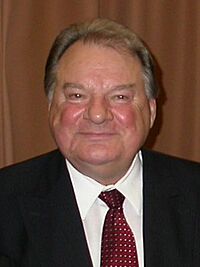Hennadiy Udovenko facts for kids
Quick facts for kids
Hennadiy Udovenko
|
|
|---|---|
|
Геннадій Удовенко
|
|

Udovenko in 2007
|
|
| 2nd Minister of Foreign Affairs | |
| In office 5 August 1994 – 17 April 1998 |
|
| Preceded by | Anatoliy Zlenko |
| Succeeded by | Borys Tarasyuk |
| President of the United Nations General Assembly | |
| In office 16 September 1997 – 8 September 1998 |
|
| Preceded by | Razali Ismail |
| Succeeded by | Didier Opertti |
| Personal details | |
| Born | 22 June 1931 Kryvyi Rih, Ukrainian SSR, Soviet Union (now Ukraine) |
| Died | 12 February 2013 (aged 81) Kyiv, Ukraine |
| Political party | People's Movement of Ukraine |
| Signature |  |
Hennadiy Yosypovych Udovenko (born June 22, 1931 – died February 12, 2013) was an important Ukrainian politician and diplomat. He served as Ukraine's Minister of Foreign Affairs, which means he was the country's top diplomat. He was also the 52nd President of the United Nations General Assembly from 1997 to 1998. Later, he became a People's Deputy of Ukraine, serving in the Ukrainian Parliament from 1998 to 2007.
Early Life and Education
Hennadiy Udovenko was born in Kryvyi Rih, which is now in Ukraine. He started his career in 1952 as a secretary in the building materials industry.
He studied international relations at Kyiv University and graduated in 1954. He also continued his studies in agricultural economics from 1956 to 1959. For a few years, from 1955 to 1958, he even led a collective farm in the Kyiv region.
A Career in Diplomacy
Udovenko began his diplomatic journey in 1959. He worked in the Department of International Economic Organizations for Ukraine's Ministry of Foreign Affairs.
From 1965 to 1971, he worked at the United Nations office in Geneva, Switzerland. He then returned to Ukraine's Foreign Ministry, leading departments related to personnel and international economic organizations.
He worked at the United Nations office in New York City from 1977 to 1980. There, he was the director of a division that helped with interpreting and meetings.
From 1980 to 1985, he was the Deputy Minister of Foreign Affairs for Ukraine. In 1985, he was given the high rank of ambassador.
Udovenko served as Ukraine's Permanent Representative of Ukraine to the United Nations from 1985 to 1992. This meant he was Ukraine's main representative at the UN. During this time, he also helped lead a UN committee against Apartheid, which was a system of racial segregation.
He was also the vice-president of the UN's Economic and Social Council from 1989 to 1991. From 1991 to 1992, he was again the Deputy Foreign Minister of Ukraine. After that, he became Ukraine's ambassador to Poland from 1992 to 1994.
His most significant role was as the Minister of Foreign Affairs of Ukraine from 1994 to 1998. This made him the chief diplomat for his country. In September 1997, he was chosen to be the president of the 52nd Session of the United Nations General Assembly. He held this important global position for one year.
Leading in Politics
After his diplomatic career, Udovenko became active in Ukrainian politics. In May 1999, he was elected chairman of the People's Movement of Ukraine (Rukh) political party. He had been acting chairman since March 1999, following the death of the previous chairman. He was re-elected in 2001 and led the party until May 2003.
As a member of the Rukh party, he was elected to the Verkhovna Rada, which is the Parliament of Ukraine, in 1998. He was re-elected to Parliament in 2002 as part of the "Our Ukraine" political group.
In Parliament, he served as the chairman of the Committee on Human Rights, National Minorities, and Inter-ethnic Relations. He worked to protect the rights of people and different groups in Ukraine.
In 2006, he was again part of the "Our Ukraine" list for the parliamentary elections. However, during a political crisis in 2007, he chose not to resign from Parliament, unlike many other members. At 76 years old, he decided not to run in the new elections that followed.
His Legacy
Hennadiy Udovenko passed away in a Kyiv hospital on February 12, 2013.
In 2017, the Diplomatic Academy of Ukraine was named after him. This academy helps train new diplomats and public servants who work in foreign relations. It is a way to remember his important contributions to Ukrainian diplomacy and international relations.
 | Anna J. Cooper |
 | Mary McLeod Bethune |
 | Lillie Mae Bradford |

